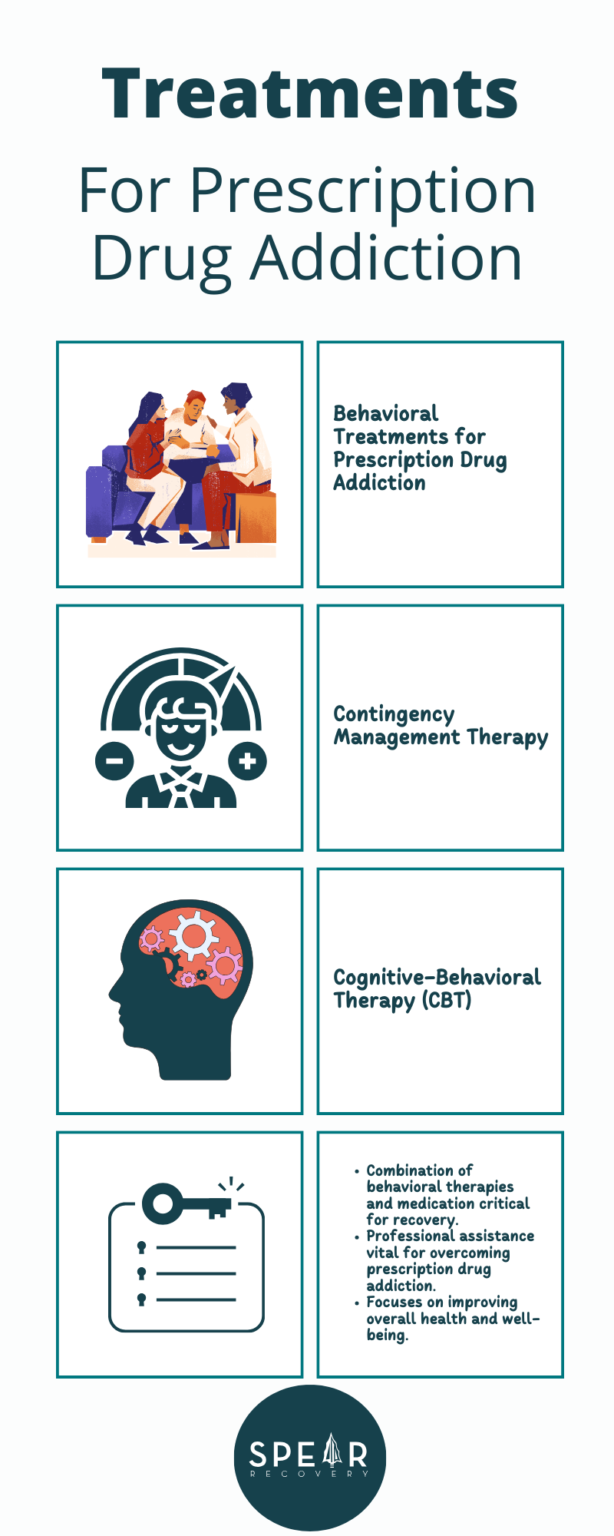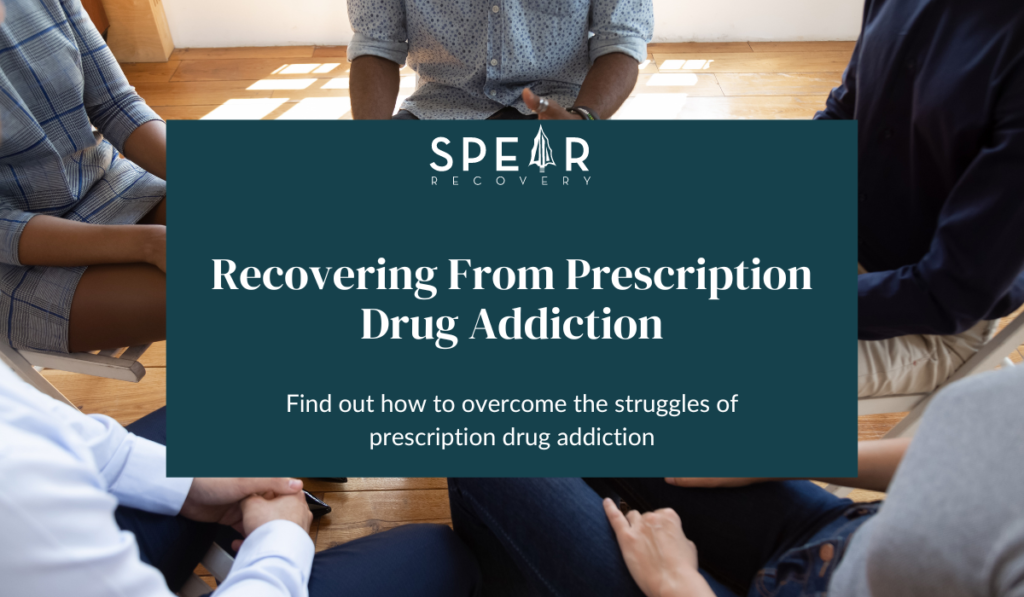Prescription drug abuse is a growing problem that can affect individuals of all ages, including young teens and older adults. Although prescription drugs are often prescribed by healthcare professionals to treat legitimate medical conditions, their misuse can lead to addiction and serious long-term consequences. Here at Spear Recovery, we provide a supportive sober living environment for men in the early stages of recovery — and we want to give an overview of recovering from prescription drug addiction and show the importance of seeking treatment for those who struggle with this issue.
Overview of prescription drug addiction and its impact
Prescription drug abuse may become ongoing and compulsive despite the negative consequences. Risk factors for prescription drug misuse include a history of substance abuse problems, preexisting mental health conditions, peer pressure or a social environment where drug use is prevalent, and easier access to prescription drugs. Older adults are also at risk of prescription drug abuse, especially when combined with alcohol.
When people enter treatment for addiction, they may have already experienced serious consequences in their lives, including disruptions to their health, their family lives, and their work. Addiction can impact many aspects of a person’s life, and successful treatment must address the whole person, including their drug use patterns and drug-related medical, mental, and social problems.
The importance of seeking treatment
Because addiction can have such a significant impact on a person’s life, seeking treatment is vital for recovery. Treatment should be tailored to address each patient’s unique needs, including their drug use patterns and any underlying medical or mental health issues. Successful treatment can help individuals overcome addiction, improve their overall health and well-being, and help them to rebuild their lives.
That said, prescription drug addiction is a serious problem that can have a significant impact on individuals and their families. Seeking treatment is essential for recovery and a return to a healthy, fulfilling life.
Types of Prescription Drugs and their Effects
Different types of prescription drugs and their effects on the brain and body
Prescription drugs come in many forms and are intended to treat a variety of disorders, including pain, anxiety, depression, and insomnia. The three classes of prescription drugs that most commonly lead to addiction are opioids, central nervous system depressants, and stimulants.
- Opioids are powerful pain relievers that can be highly addictive. They work by binding to specific receptors in the brain and body that regulate pain and pleasure. Over time, the body develops a tolerance to opioids, meaning that increasingly higher doses are required to achieve the same level of pain relief. This can lead to dependence, addiction, and potentially fatal overdose.
- Central nervous system depressants are prescribed to treat anxiety and sleep disorders. These drugs slow down brain activity and can have a calming effect. Prolonged use of these drugs can lead to addiction, cognitive impairment, and respiratory depression.
- Stimulants are prescribed to treat attention deficit hyperactivity disorder (ADHD), narcolepsy, and other conditions. These drugs increase activity in the brain and body and can improve focus, attention, and alertness. Long-term use of stimulants can lead to addiction, anxiety, paranoia, and other serious health problems.
The dangers of long-term use and addiction
Prolonged use of prescription drugs can have serious consequences for a person’s health and well-being. Addiction can lead to physical and psychological dependence, withdrawal symptoms, and an increased risk of overdose. Long-term use of prescription drugs can also cause damage to vital organs, including the liver, kidneys, and heart.
If you or someone you love is struggling with prescription drug addiction, it’s essential to seek professional help. Treatment for addiction can be tailored to meet the unique needs of each patient and may include medication-assisted therapy, cognitive-behavioral therapy, and other evidence-based approaches. With the right treatment and support, it’s possible to overcome prescription drug addiction and reclaim a healthy, fulfilling life.
Behavioral Treatments for Prescription Drug Addiction

Overview of behavioral treatments for prescription drug addiction
Behavioral treatments are important when it comes to recovering from prescription drug addiction. Behavioral treatments help patients change their thoughts and behaviors related to drug use, learn strategies to manage cravings and avoid triggers, and improve their relationships and functioning. Behavioral treatments can take many forms, such as individual, family, or group counseling.
Contingency management therapy for substance abuse
Contingency management therapy is a behavioral treatment that uses positive reinforcement to incentivize patients to remain abstinent from drug use. Patients are given rewards or incentives for remaining drug-free, such as vouchers for goods and services, or a chance to win a prize. This form of therapy has been effective in increasing drug abstinence rates in patients with opioid and stimulant addiction.
Cognitive-behavioral therapy for substance abuse
Cognitive-behavioral therapy (CBT) is a type of therapy that helps patients identify and change negative thinking patterns and behaviors that contribute to drug use. Patients learn coping mechanisms to deal with cravings and triggers and develop problem-solving skills to handle stressful situations that may arise during recovery. CBT has been shown to be effective in treating a range of substance use disorders, including prescription drug addiction.
That said, behavioral treatments are an important component of treating prescription drug addiction. Patients can benefit from a combination of medication-assisted therapy and behavioral treatments like contingency management therapy and cognitive-behavioral therapy. Seeking professional help is essential to overcome prescription drug addiction and improve the overall health and well-being of the patient.
Detoxification and Withdrawal
The importance of detoxification and withdrawal
Detoxification and withdrawal from drugs or alcohol use often form the initial phase of addiction treatment. It is an essential step towards recovery and is aimed at removing all traces of drugs or alcohol from the body. While detoxification and cessation may provide some relief, it is crucial to understand that it may not necessarily lead to abstinence in the long term. This is because some drugs, such as heroin, may have a chronic relapsing course that can span over decades.
The detox and withdrawal process
Withdrawal from alcohol or drugs can be an uncomfortable and challenging process. Technically, withdrawal is your body’s reaction after becoming physically dependent on a substance, and it occurs once a person stops using a drug or reduces their dosage. Symptoms can vary from mild to severe and may include anxiety, insomnia, sweating, and tremors. With certain substances like opioids, withdrawal can be life-threatening, and people should seek professional help before attempting to detox without assistance.
The detoxification process is often accompanied by medical management of withdrawal symptoms. Close monitoring of vital signs, psychological support, and medication may be provided to make the process as comfortable as possible. Medical professionals may administer pharmaceutical interventions such as methadone or buprenorphine to help manage symptoms of opiate withdrawal. Undergoing detoxification and withdrawal under close medical supervision can significantly reduce the risks associated with withdrawal.
Detoxification and withdrawal form an essential part of addiction treatment and can help individuals to transition towards recovery. With the right support and care, people can manage the process of withdrawal and move towards long-term abstinence from drug and alcohol use.
Aftercare and Recovery From Prescription Drug Addiction
The importance of aftercare in recovery
After completing treatment in an addiction treatment center, the journey towards recovery continues. Aftercare is an essential step to maintaining sobriety as it provides ongoing support that one needs to adjust to their new life. It is estimated that up to 60% of people relapse within the first year of recovery, making aftercare critical to one’s success in becoming sober.
An aftercare plan provides a roadmap that identifies individuals’ needs and prepares them for the challenges that may arise in their recovery journey. It may include several activities and resources to support a person in maintaining their sobriety. Aftercare plans may vary, depending on individual factors, such as the type of addiction and the level of care required.
Aftercare options: 12-step programs, support groups, and counseling
There are various aftercare options for people in recovery from addiction. One of the most common forms of aftercare is participation in a 12-step program such as Alcoholics Anonymous (AA) or Narcotics Anonymous (NA), where individuals attend meetings to receive support from peers and mentors who have had similar experiences.
Support groups are another popular option that provide individuals with a safe space to discuss their challenges, gain insight from others’ experiences, and create a sense of community. Professional counseling can also be an essential component of aftercare. It can help individuals address underlying issues that may have led to their addiction and develop new coping mechanisms for building a more significant and fulfilling life.
Aftercare plays a crucial role in addiction recovery. With the right support and care, individuals can develop the skills and inspiration necessary to maintain their sobriety and live a healthy life.
Overcoming Cravings and Relapse Prevention
The challenges of cravings and triggers
Individuals in addiction recovery frequently encounter cravings and triggers that can lead to relapse. These experiences can be challenging to manage, which is why professional assistance is vital. Seeking out addiction treatment can help reduce the frequency and intensity of cravings and triggers while providing the necessary coping skills to manage them effectively.
Strategies for preventing relapse
There are various strategies for preventing relapse, including therapy and skill development, medications, and monitoring. Developing a relapse prevention plan tailored to an individual’s unique recovery needs can also be effective in preventing relapse. This plan can include setting future goals, reminding oneself of the negative impacts of substance abuse, and identifying specific actions to take when cravings arise.
In addition to individual strategies, ongoing support is critical for preventing relapse, and aftercare is an essential component of addiction recovery. Aftercare options include participation in a 12-step program, support groups, and professional counseling to address underlying issues and develop new coping mechanisms.
Now, overcoming cravings and preventing relapse is a crucial aspect of addiction recovery. Seeking professional assistance, developing a personalized relapse prevention plan, and engaging in ongoing aftercare can all contribute to maintaining sobriety and a healthy life.
Final Thoughts: Recovering from Prescription Drug Addiction
The road to addiction recovery is a challenging one that requires significant commitment, effort and support. Developing a new way of living is crucial for success. Individualized treatment can vary according to the specific drug used, but essential elements often include detoxification and behavioral counseling. More importantly, it’s essential to find a program that feels right and addresses more than just drug abuse.
The journey to recovery
Successful addiction treatment is not a quick and easy process; commitment and follow-through are key to maintaining sobriety. Individuals in addiction recovery frequently encounter cravings and triggers that can lead to relapse. Developing a relapse prevention plan tailored to an individual’s unique recovery needs can be effective in preventing relapse. This plan can include setting future goals, reminding oneself of the negative impacts of substance abuse, and identifying specific actions to take when cravings arise. Ongoing support is critical for preventing relapse, and aftercare is an essential component of addiction recovery.
The importance of support and self-care
Addiction affects the whole life, including relationships, career, health, and psychological well-being. Thus, ongoing support from family, friends, or medical professionals is crucial for an individual’s long-term recovery. Similarly, self-care is crucial to maintaining sobriety. Developing healthy coping mechanisms, engaging in physical activity, and seeking therapy or counseling can all play significant roles in managing the underlying issues that contributed to drug addiction in the first place. With the right support individualized treatment, and self-care, the journey to addiction recovery is possible.
Now, here at Spear Recovery, we believe men shouldn’t deal with recovering from prescription drug addiction alone. That said, if you’re looking for a luxury men’s sober living in Los Angeles, find out more here. If you’re in the Denver area, check out our brand-new luxury men’s sober living home here.

